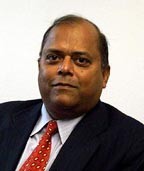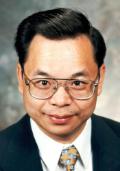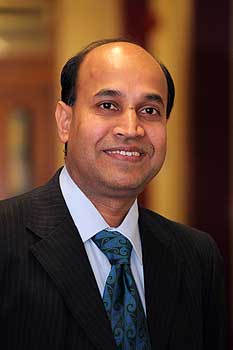Keynote Speaker I

Professor Ramesh K. Agarwal
William Palm Professor of Engineering,
Fellow of AIAA, ASME, IEEE, SAE, APS, ASEE and AAAS
Washington University in St. Louis
Speech Title: Computational Studies of Active Flow Control and Aerospace Applications
Abstract: In recent years, a promising approach to the control of wall bounded as well as free shear flows, using synthetic jet (oscillatory jet with zero-net-mass-flux), pulsed jet, and sweeping jet actuators, has received a great deal of attention. A variety of impressive active flow control (AFC) results have been achieved experimentally by many researchers including the vectoring of conventional propulsive jets, modification of aerodynamic characteristics of bluff bodies, control of lift and drag of airfoils, thrust augmentation in ejectors, reduction of skin-friction in a boundary layer flow, enhanced mixing in circular jets, control of external as well as internal flow separation and of cavity oscillations. More recently, attempts have been made to numerically simulate many of these flow fields primarily by employing the Unsteady Reynolds-Averaged Navier Stokes (URANS) equations with a turbulence model and in a limited few cases by Large Eddy Simulation LES) and Direct Numerical Simulation (DNS). In this lecture, the results of simulations of several flow fields dealing with thrust-vectoring control of a propulsive jet, control of separation on a backward facing step, NASA Hump and flap of a multi-element airfoil, control of cavity oscillations, transonic drag reduction of an airfoil, and some aerospace applications such as AFC of high-speed weapon release from a bay, weapons bay acoustic loads reduction and B757 tail for side force augmentation will be described. These simulations have been performed using the URANS equations in conjunction with either a one- or a two-equation turbulence model. The simulations demonstrate the effectiveness of active flow control techniques in flow modification to achieve the desired outcome of drag reduction and separation control in many aerospace applications.
Bio: Professor Ramesh K. Agarwal is the William Palm Professor of Engineering in the department of Mechanical Engineering and Materials Science at Washington University in St. Louis. From 1994 to 2001, he was the Sam Bloomfield Distinguished Professor and Executive Director of the National Institute for Aviation Research at Wichita State University in Kansas. From 1978 to 1994, he was the Program Director and McDonnell Douglas Fellow at McDonnell Douglas Research Laboratories in St. Louis. Dr. Agarwal received Ph.D in Aeronautical Sciences from Stanford University in 1975, M.S. in Aeronautical Engineering from the University of Minnesota in 1969 and B.S. in Mechanical Engineering from Indian Institute of Technology, Kharagpur, India in 1968. Over a period of 45 years, he has worked in several disciplines within mechanical & aerospace engineering, and energy and environment which include computational fluid dynamics, computational electromagnetics and acoustics, control theory, multidisciplinary design and optimization, turbomachinery and pumps, chemical looping combustion, carbon capture and sequestration, and wind energy. He is the author and coauthor of over 600 publications. He has given many plenary, keynote and invited lectures at various national and international conferences worldwide in over sixty countries. He is a Fellow of 26 professional societies including American Institute of Aeronautics and Astronautics (AIAA), American Society of Mechanical Engineers (ASME), Institute of Electrical and Electronics Engineers (IEEE), Society of Automotive Engineers (SAE), American Association for Advancement of Science (AAAS), American Physical Society (APS) and American Society for Engineering Education (ASEE). He has received many prestigious honors and national/international awards from various professional societies and organizations for his research contributions including the AIAA Reeds Aeronautics Award, SAE Medal of Honor, ASME Honorary Membership and Honorary Fellowship from Royal Aeronautical Society.
Keynote Speaker II

Professor Simon X. Yang
University of Guelph
Speech Title: Bio-inspired Intelligent Approaches to Real-time Navigation and Cooperation of Multiple Robotic Systems
Abstract: Research on biologically inspired intelligence has made significant progress in both understanding the biological systems and developing bionic engineering applications to various autonomous robotics systems. In this talk, I will start with a very brief introduction to biologically inspired computational neural dynamics algorithms and their applications to biological and bio-inspired systems. After that, I will focus on our recent research on bio-inspired intelligent real-time navigation and cooperation of various multiple autonomous robotic systems, such as real-time path planning, tracking, and control of autonomous mobile, aerial, water surface and underwater robotic systems; and intelligent navigation and cooperation of multi-robot systems.
Bio: Prof. Simon X. Yang received the B.Sc. degree in engineering physics from Beijing University, China in 1987, the first of two M.Sc. degrees in biophysics from Chinese Academy of Sciences, Beijing, China in 1990, the second M.Sc. degree in electrical engineering from the University of Houston, USA in 1996, and the Ph.D. degree in electrical and computer engineering from the University of Alberta, Edmonton, Canada in 1999. Prof. Yang joined the School of Engineering at the University of Guelph, Canada in 1999. Currently he is a Professor and the Head of the Advanced Robotics & Intelligent Systems (ARIS) Laboratory at the University of Guelph in Canada. Prof. Yang has diversified research expertise. His research interests include intelligent systems, robotics, control systems, sensors and multi-sensor fusion, wireless sensor networks, intelligent communications, intelligent transportation, machine learning, and computational neuroscience. Prof. Yang he has been very active in professional activities. Prof. Yang serves as the Editor-in-Chief of International Journal of Robotics and Automation, and Intelligence & Robotics; and an Associate Editor of IEEE Transactions on Cybernetics, IEEE Transactions on Artificial Intelligence, and several other journals. He has involved in the organization of many international conferences.
Keynote Speaker III

Professor Subhas Mukhopadhyay
Discipline Leader, Mechatronics Engineering Degree Programme, School of Engineering
Fellow of IEEE, IET and IETE
Macquarie University NSW 2109 Australia
Speech Title: Recent Advances in Sensing and Machine Vision for Mechatronics
Abstract: The advancement of sensing technologies, embedded systems, wireless communication technologies, nano-materials, miniaturization, vision sensing and processing speed makes it possible to develop smart mechatronics and machine systems. This seminar will discuss recent research and developmental activities on different sensors and sensing system along with machine visions at Macquarie University as applicable to Mechatronics, robotics and drones for home, health and environmental monitoring.
Bio: Subhas holds a B.E.E. (gold medallist), M.E.E., Ph.D. (India) and Doctor of Engineering (Japan). He has over 31 years of teaching, industrial and research experience.Currently he is working as a Professor of Mechanical/Electronics Engineering, Macquarie University, Australia and is the Discipline Leader of the Mechatronics Engineering Degree Programme. His fields of interest include Smart Sensors and sensing technology, instrumentation techniques, wireless sensors and network (WSN), Internet of Things (IoT), Mechatronics etc. He has supervised over 50 postgraduate students and over 150 Honours students. He has examined over 75 postgraduate theses.
He has published over 450 papers in different international journals and conference proceedings, written ten books and fifty two book chapters and edited eighteen conference proceedings. He has also edited thirty five books with Springer-Verlag and thirty two journal special issues. He has organized over 20 international conferences as either General Chairs/co-chairs or Technical Programme Chair. He has delivered 420 presentations including keynote, invited, tutorial and special lectures. As per Scholargoogle, his total citation is 18077 and h-index is 68.
He is a Fellow of IEEE (USA), a Fellow of IET (UK), a Fellow of IETE (India). He is a Topical Editor of IEEE Sensors journal. He is also an associate editor of IEEE Transactions on Instrumentation and Measurements and IEEE Reviews in Biomedical Engineering (RBME). He is a Distinguished Lecturer of the IEEE Sensors Council from 2017 to 2022. He chairs the IEEE Sensors Council NSW chapter.